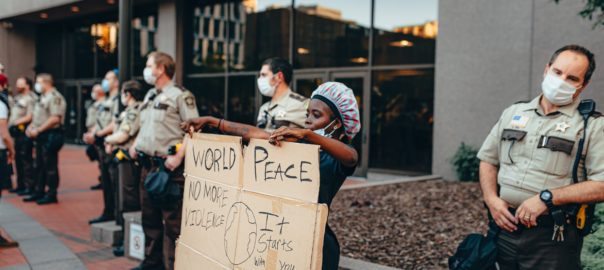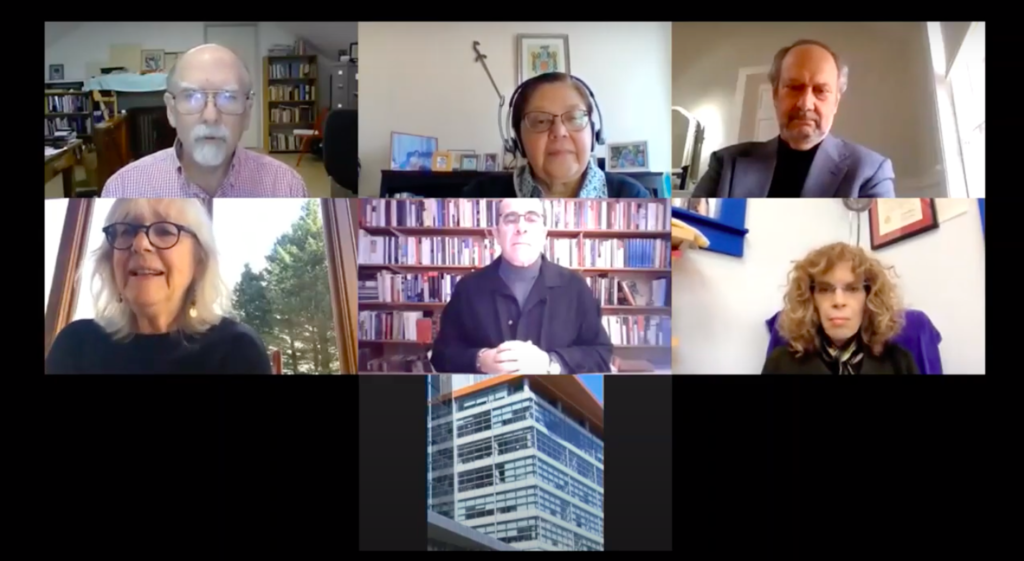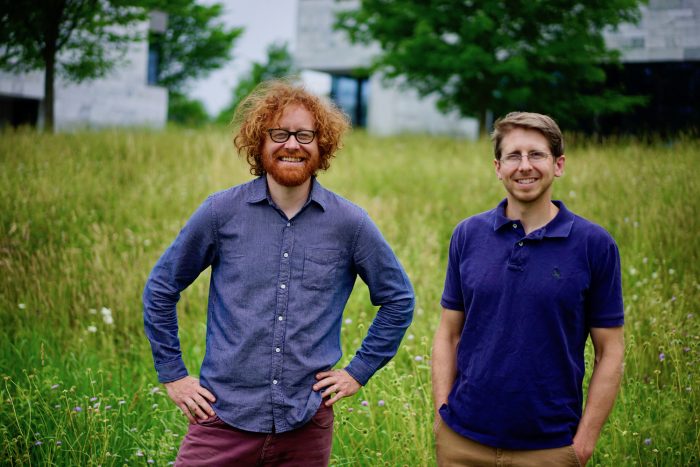
US Elections 2020
"Our most fundamental need is for a habitable planet - and we’ve lost sight of it"
In order to better understand the current fight for the presidency in the US, John Hultgren and David Bond from Bennington College (Vermont, USA) talked to Gareth Dale about the importance of the Green New Deal, the need for a reduction of fossil fuels and the Degrowth movement.
29th October, 2020
The Green New Deal and the Threat of Corporate Capture
David Bond & John Hultgren: The Green New Deal has captured the imagination of the Left in the US and beyond. After decades of playing defense, the Green New Deal advances a bold progressive vision on par with the immense need of today: a moment tipping precariously towards climate catastrophe. The Green New Deal also has the great advantage of harkening back to an immensely popular moment when government reimagined its responsibilities to the people. Drawing on Karl Polanyi’s own “ambivalences and ambiguities” about the New Deal, you advise caution on the Green New Deal. Can you explain your hesitations around the Green New Deal?
Gareth Dale: As you say, the climate catastrophe is tipping perilously. The Mauna Loa emissions graph climbs ever upwards. Radical change is urgent, and the GND is visionary. We shouldn’t see it as a definitive programme but as a “battlefield”—to use Thea Riofrancos’ term. And so too was Roosevelt’s New Deal. He didn’t enter office with a social-democratic agenda. It came thanks to movements—the hunger marches and rent strikes, the Teamster Rebellion and the waves of sit-down strikes. Those same years remind us that when organisers and movement leaders tied themselves to state institutions, their ability to mobilise went into decline. And while the New Deal did enact vital progressive reforms, and legitimated the unions, it also re-stabilised the capitalist order. It consolidated America’s grotesque, nature-trashing growth model—and then Roosevelt launched the US oil grab in the Middle East. Similar dangers face the GND today. State leaders and corporate interests are trying to own it. We saw this back in 2008 with the so-called green stimulus packages in South Korea and China. When you looked at the detail there’s virtually nothing green, it’s almost entirely greenwash and growth boosterism. The same was seen again in South Korea this year with its new GND. Within a fortnight of the announcement, the Korean government authorised a colossal bailout of Doosan Heavy Industries, one of the world’s biggest coal exporters. So any “caution” I’m voicing is against the threat of corporate capture. The movement angle of the GND, the campaigning efforts and visions of environmentalists and socialists, is inspiring—a bright light in the general murk.
“When organisers and movement leaders tied themselves to state institutions, their ability to mobilise went into decline”
David Bond & John Hultgren: Despite being quite popular and fanning the enthusiasm of the progressive wing of the Democratic Party, in the current presidential campaign the Green New Deal is lambasted by both sides. Trump calls it a socialist takeover of American democracy while Biden backpedals into a less transformational, more corporate friendly, and utterly devoid of social justice version he calls “Build Back Better.” With so much at stake in 2020, why do you think now is the time to push the Green New Deal to clarify its relation to growth in particular and to the capitalist state in general?
Gareth Dale: Surely it’s always the time to clarify the relations of political projects to capital and capitalist states, for it’s they who set the economic and political framework, the rules. It’s their machine that’s steering the world to the precipice. Trump’s version is the death cult, exulting in planetary arson. Biden is a bit less repulsive, but driving a similar juggernaut. He’s currently distancing himself from the GND but if he returns, it’ll be with the aim of clipping its wings, taming it for Wall Street. So yes, in November 2020 there’s a lot at stake—and this campaign year also showcased the ability of the US electoral system to blackmail the left, with the threats that any militancy will endanger the Democrats’ prospects. So, whoever wins, organising in our communities and on the streets (…um, with masks of course…) will be more needed than ever: to push back the fascists, to keep the heat on Biden (if he wins), but also to begin to build left spaces independent from the state-supporting parties.
Fossil Fuel Reduction, Poverty Reduction & Degrowth
David Bond & John Hultgren: COVID-19 has shuttered economies around the globe and sent hundreds of millions of people worldwide into abject forms of destitution. As transportation ground to a halt and people sheltered in place, fossil fuel consumption declined significantly. You note that the sharp reductions in CO2 emissions we’ve experienced in the past 9 months must continue for decades to stave off the worst of climate change and retain some semblance of modern society. How can we continue drastic reductions of fossil fuels without also sending billions of people into poverty?
Gareth Dale: Well, billions of people already are in poverty. If we don’t drastically reduce fossil fuel use, they’ll be sent into early graves—and perhaps the human species with them—through the well-established laws of global heating and the slightly less predictable feedback loops that it’s triggering. As to how to reduce, the climate threat is so severe that drastic reductions are needed of both fossil fuel production and overall demand. So, ramp up renewables, quickly. And cut demand. Human energy consumption rose from forty terrajoules per year in 1900 to a hundred in 1950 to over five hundred today. That’s unsustainable, and can’t all be supplied by wind and waves. Obvious targets are the consumption of the super-rich, and the Pentagon—slash all that. Direct resources instead to supporting the poor, ensuring good food and shelter, and water, sanitation and electricity for all. And beyond? Well, homo sapiens is an enthrallingly needs-expanding species, but are we also a needs-comprehending species? Our most fundamental need is for a habitable planet and we’ve lost sight of it—thanks to the blinkers enforced by the capitalist system. Really, humanity should hunker down for a few hundred years. Tread lightly, to save ourselves and millions of species. This isn’t a prescription for hair shirts and self-flagellation, but resource and energy use must be clipped. You and I met at a Karl Polanyi conference. Well, in the early twentieth century Polanyi lived a happy and culturally extremely rich life, consuming a small fraction of the energy and materials that are at the command of his counterparts today. And Marx and Engels in the Communist Manifesto argued that the productive forces had reached the point at which a transition to communism could be envisaged. This was 1848. Before the invention of the car, the telephone, even the safety pin. I’m not suggesting we ‘rewind’ to that date. But for the love of life, of people and nature, present and future, a few delights of civilisation simply have to be suspended: all SUVs, all aviation (apart from dirigibles), nearly all beef (unless lab-grown), and so on.
“Our most fundamental need is for a habitable planet and we’ve lost sight of it—thanks to the blinkers enforced by the capitalist system.”
David Bond & John Hultgren: Degrowth, you have argued, is actually the most sober assessment of the current situation. Yet it struggles, as you note, to “find mass resonance.” Part of the New Deal, you suggest, contained kernels of contemporary degrowth – the government suppressed housing construction, people tore up their lawns and grew victory gardens, etc. Yet outside of the inflamed patriotism of a nation at war, it’s hard to imagine such sacrifice becoming a core commitment of party platforms let alone policies in the US. How can degrowth gain an enthusiastic base? Can we have a “homefront ecology” shorn of its nationalism?
Gareth Dale: A ’sober’ assessment of our situation is hard to reach. Can human minds really grasp the import of the climate catastrophe, the accelerating mass extinctions that their society is causing, let alone the possible end of their species itself? But yes, the degrowthers come closer than anyone else. In terms of strategy, I would put a rather different emphasis: I’d emphasise climate jobs programmes. These bring labour unionists together with environmentalists to campaign for a state-led ‘just transition,’ with secure ‘green jobs’ and care jobs and across-the-board economic change. It’s a programme that can address, and counter, two great fears of the present—mass unemployment and environmental collapse.
David Bond & John Hultgren: The poor have, in one way or another, been living a coercive form of degrowth for generations. Is there a class dimension to your theory of degrowth?
Gareth Dale: Degrowthers would say you’re completely misrepresenting their position. Their politics is all about overcoming poverty even as the materials and energy envelope reduces. And in some of my own work (The tide is rising, don’t rock the boat!), I’ve discussed how the growth paradigm, as an ideology of capitalist society, has been used historically to legitimate poverty and inequality. So yes, all of this pivots on class. The capitalist system is geared to relentless accumulation, which is spun as “growth,” which destroys nature, polarises society by class, by race, by gender and between rich and poor nations. The ownership of the world by a particular class—capitalists—who are driven by competition and the profit motive—is the root of all these evils.
“The capitalist system is geared to relentless accumulation, which is spun as “growth” and destroys nature, polarises society by class, by race, by gender and between rich and poor nations.”
David Bond & John Hultgren: The last decade has brought tremendous hope for progressive policies in the US as the neoliberal agenda is shown to be insufficient to the present challenges and actually part of the problem. In many parts of the world, the perennial logic of austerity is weakening and tax hikes on the obscenely wealthy promise a new boon to an emboldened progressive state (in the US, nationalized healthcare, free college education, and the Green New Deal). Is there a danger, in such a conjuncture, that a turn to degrowth morphs into an argument for austerity by progressive means?
Gareth Dale: Degrowthers are totally opposed to neoliberal austerity politics. A few of them do re-work the term ‘austerity’, but for very different purposes. On this, I criticise their position, you can find it in Degrowth and the Green New Deal. But it’s a small difference, perhaps only a quibble. And I hope you’re right about the tax hikes on the super-rich!
Polanyi's non-revolutionary Socialism
David Bond & John Hultgren: You argue that Polanyi “advanced a radical but non-revolutionary socialism.” Is there a contemporary party or movement that is similarly advocating for this brand of socialism? Where does BLM fit into this?
Gareth Dale: Yes, Polanyi was an anti-capitalist but didn’t understand capitalism—indeed, it wasn’t even on his theoretical compass. I think Bernie and especially Corbyn are quite close to his politics. That came with some tremendous strengths—not least of course the ability to build a sizeable socialist movement—but also weaknesses—including the tendency to collapse back into the liberal centre, and in Sanders’ case to cast votes for US imperialist adventures and projects. As to BLM, well, how much has it taught us, yet again this year! What an inspiring reminder of the capacity of popular rebellion to shake up an ossified political landscape. It has reminded us how radical politics can challenge the state ‘from without.’ Thanks to BLM, race politics in the US may have made greater strides during Trump’s tenure than any time since the 1960s. Possibly not. But even to have raised this as a possibility would’ve been laughed out of court half a year ago when politics still seemed a space strictly reserved for the state-supporting parties.
Gareth Dale
Gareth Dale is senior lecturer in politics and international relations at Brunel University, London. Before joining Brunel in 2005, he worked at Birkbeck, the LSE and Swansea University. His most recent books are Karl Polanyi: A Life on the Left and Reconstructing Karl Polanyi: Excavation and Critique, and a critique of ‘Green Growth’ (all in 2016).
David Bond
Associate Director of CAPA (Center for the Advancement of Public Action) in Bennington College, Vermont, USA
John Hultgren
Faculty of Society, Culture & Thought and Faculty of Environmental Studies, Bennington College Vermont, USA
More on the US:


